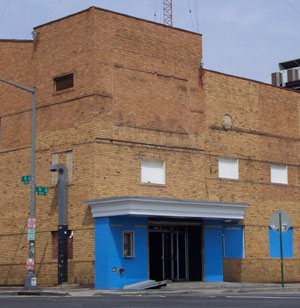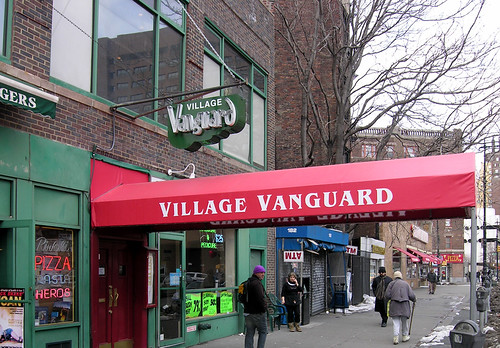25 August 2009
13 August 2009
Hiatus
I'm off on vacation through next Friday. I'll be back with you shortly thereafter. In the meantime, below are this month's links.
- Jazz.com remembers Don Ellis (part 1/part 2).
- Miles Davis skateboards!!1!1
- destination: OUT is rerunning some old favorites this month, be sure to check that out.
- The new Dave Holland site has some free bonus tracks from Pass it On.
- The Newport Jazz Festival was last weekend. NPR's A Blog Supreme has photos (1, 2, 3), as does Nate Chinen. NPR Music has full coverage, plus archived performances, here.
- The Bad Plus' Ethan Iverson on his vinyl collection.
- Longtime jazz writer Chris Albertson has a new blog, Stomp Off in C... (h/t jazz.com).
Rashied Ali
 Rashied Ali has died at the age of 74. Ali was a major player in the avant garde scene of the late 1960s, replacing Elvin Jones in the drum chair of John Coltrane's group and also playing with Paul Bley and James "Blood" Ulmer, among others. He had not slowed down in the winter of his years, his trio with alto saxophonist Charles Gayle and bassist William Parker, dubbed By Any Means, played at Newport last weekend.
Rashied Ali has died at the age of 74. Ali was a major player in the avant garde scene of the late 1960s, replacing Elvin Jones in the drum chair of John Coltrane's group and also playing with Paul Bley and James "Blood" Ulmer, among others. He had not slowed down in the winter of his years, his trio with alto saxophonist Charles Gayle and bassist William Parker, dubbed By Any Means, played at Newport last weekend.Hot House readers are recommended, nay required to listen to his work on Coltrane's Interstellar Space
In a way, Rashied Ali was playing more like a soloist along with the soloist, but they were finding all kinds of beautiful unisons within the counterpoint that they were creating with each other.
Image via JazzTimes
11 August 2009
Review: That's Gonna Leave a Mark
Matt Wilson Quartet
 Jazz and historical scholarship share a similar pathological obsession with the new. Historians are rewarded more for writing something new than writing something well. I read more than a few books in grad school in which noted scholars and sharp minds stretched an idea far past the point of usefulness in order to make a book-length argument that had never been made before (not naming names...). Meanwhile, there seems to be a scarcity of syntheses which may not be earth-shattering but nonetheless incorporate miscellaneous ideas from other works into a coherent, convincing final product.
Jazz and historical scholarship share a similar pathological obsession with the new. Historians are rewarded more for writing something new than writing something well. I read more than a few books in grad school in which noted scholars and sharp minds stretched an idea far past the point of usefulness in order to make a book-length argument that had never been made before (not naming names...). Meanwhile, there seems to be a scarcity of syntheses which may not be earth-shattering but nonetheless incorporate miscellaneous ideas from other works into a coherent, convincing final product.Such is the case in jazz. Consider this critique of Wynton Marsalis from Destination: Out!
There was something intractably stodgy about much of this neo-traditional work, lacking both the spark found in the original forms and the thrilling innovations of the so-called avant garde. To our ears, it was minor music with a major publicist.I'm not begrudging the argument, because I kind of feel the same way. Whenever I listen to Black Codes (From the Underground)
This is where Matt Wilson comes in. His latest album, That's Gonna Leave a Mark
Altoist Andrew D'Angelo provides two originals on the album, Shooshabuster and Rear Control, which are among the most intriguing moments of the disc. D'Angelo's compositions are quirky and energetic, with the kind of out-of-the-box thinking that I love when applied to jazz composition. Listen to Rear Control (below); the fusion of the melody and bass line in the A section is a perfect marriage of melody, harmony, and rhythm (you may even call it harmolodic if you knew what you were talking about).
This album likely will not make any top ten lists at the end of the year, and there's a good chance that it will recede into the dark recesses of my music library after awhile, but it is nonetheless a fun listen that shouldn't be put down because it doesn't say anything new.
Bonus Material:
Track Listing: Shooshabuster; Arts & Crafts; Rear Control; Getting Friendly; Two Bass Hit; Area Man; Lucky; That's Gonna Leave a Mark; Celibate Oriole; Come and Find The Quiet Center; Why Can't We Be Friends
Personnel: Andrew D'Angelo, alto saxophone, bass clarinet; Jeff Lederer, tenor saxophone, soprano saxophone, clarinet; Chris Lightcap, bass; Matt Wilson, drums
09 August 2009
A Suggestion for Expanding the Audience for Jazz
There has been much recent chatter in the blogosphere on the declining audience for jazz. In the Wall Street Journal this weekend, Terry Teachout points out that in the process of becoming a self-conscious art music during the middle of the twentieth century, jazz music became no longer "capable of appealing to the same kind of mass audience that thrilled to the big bands of the swing era." Peter Hum investigated a number of approaches to expanding the jazz audience on Thursday, including hybridizing jazz with other musical forms (an approach which yielded mixed results during the 1970s), promoting younger artists more heavily, and getting John Scofield into the next guitar hero game (which I think would be a great idea regardless of the implications on the audience of jazz). At A Blog Supreme, Patrick Jarenwattananon notes that attendance at all "high-cultural activity" is down (likely due in part to the economic crisis), but is nonetheless troubled by the shrinking audience.
I think jazz musicians can take a lesson from alternative comedy in expanding the audience. In the wake of the comedy boom of the 1980s, a number of comedians like David Cross, Janeane Garafolo, and Patton Oswalt began looking for new venues for stand-up. The idea was to perform where their audience would already be, rather than pulling their fans into the already-established network of comedy clubs. As Nathan Rabin of the AV Club put it, "Fans of Comedians mainstays Patton Oswalt and Zack Galifianakis are more likely to check out an indie band at The Troubadour than shell out $40 to see a Tonight Show regular play Señor Ha Ha's Laughatarium." So why not follow your fans to their native setting?
While this movement initially grew out of Los Angeles, alternative comedy scenes also began to flourish in Seattle, New York, Chicago, and a number of other cities. What is important to remember, though, is that instead of altering their acts to make them more palatable to younger audiences, these comics simply brought there acts to venues where young people who would otherwise like their material would go to see a comedy show.
I do not know if the "answer" to jazz's audience question will be to move performances to indie rock clubs (though some performers, like The Bad Plus and Medeski Martin & Wood, already play a number of gigs each year at these kinds of venues), but I am certain that the current jazz club paradigm repels a good number of people from live jazz. The club itself is a good atmosphere for jazz; small and intimate, enabling a personal connection between artist and audience. But it is not everyone's ideal. This is not a new criticism. Jazz clubs are expensive (one night I saw Kenny Garrett in Miami at the now-defunct Arturo Sandoval's Jazz Cafe, and paid a $30 cover with a two-drink minimum on top of that - and those two drinks were not cheap). Compare that to an indie-rock venue, where you can see a good band for $20 (and the beer is cheaper).
 The 9:30 Club in Washington, DC, where you can see Son Volt, Mos Def, Janeane Garafolo, and The Bad Plus.
The 9:30 Club in Washington, DC, where you can see Son Volt, Mos Def, Janeane Garafolo, and The Bad Plus.Jazz clubs are also not mixed-use. Most people listen to a variety of genres, and are more likely to attend shows at the same venue if it offers an eclectic range of performances. Jazz clubs, while housing a diversity of jazz artists, largely stick to jazz, which may limit the marketing possibilities for jazz. The 9:30 Club in Washington, DC, hosts a variety of acts ranging from hip hop to indie rock to standup comedy, as well as numerous points in between. It would seem like an advantage for the club itself to draw from diverse fanbases, and that at least a small part of the audience from a Mos Def show might be interested in seeing a jazz act at the same venue if they saw some promotional material (posters, flyers, etc.) for that act while at the Mos Def show (I believe the marketing term for this is cross-promotion).
Maybe we won't see thousands of budding young jazz fans flowing out from mixed-use venues like these, but it certainly would not hurt to try and expand the live-music model, which is limited mostly to jazz clubs and summer festivals. Jazz musicians may not reap the same rewards that alternative comics found, but they cannot wait around for their audience to find them, they must seek them out personally.
UPDATE: Howard Mandel thinks Teachout doth protest too much, while Jason Parker is onto something.
Vanguard photo via Professor Bop's flickrstream, 9:30 Club photo via Excess Void.
04 August 2009
Subscribe to:
Posts (Atom)




